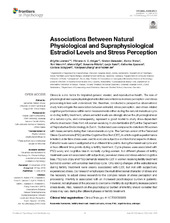| dc.contributor.author | Leeners, Brigitte | |
| dc.contributor.author | Krüger, Tillman H.C. | |
| dc.contributor.author | Geraedts, Kirsten | |
| dc.contributor.author | Tronci, Enrico | |
| dc.contributor.author | Mancini, Toni | |
| dc.contributor.author | Egli, Marcel | |
| dc.contributor.author | Röblitz, Susanna | |
| dc.contributor.author | Saleh, Lanja | |
| dc.contributor.author | Spanaus, Katharina | |
| dc.contributor.author | Schippert, Cordula | |
| dc.contributor.author | Zhang, Y | |
| dc.contributor.author | Ille, Fabian | |
| dc.date.accessioned | 2020-08-17T08:54:47Z | |
| dc.date.available | 2020-08-17T08:54:47Z | |
| dc.date.issued | 2019-06-11 | |
| dc.Published | Leeners, Krüger, Geraedts, Tronci, Mancini, Egli, Röblitz S, Saleh, Spanaus, Schippert, Zhang Y, Ille. Associations Between Natural Physiological and Supraphysiological Estradiol Levels and Stress Perception. Frontiers in Psychology. 2019;10:1296 | eng |
| dc.identifier.issn | 1664-1078 | en_US |
| dc.identifier.uri | https://hdl.handle.net/1956/23805 | |
| dc.description.abstract | Stress is a risk factor for impaired general, mental, and reproductive health. The role of physiological and supraphysiological estradiol concentrations in stress perception and stress processing is less well understood. We, therefore, conducted a prospective observational study to investigate the association between estradiol, stress perception, and stress-related cognitive performance within serial measurements either during the natural menstrual cycle or during fertility treatment, where estradiol levels are strongly above the physiological level of a natural cycle, and consequently, represent a good model to study dose-dependent effects of estradiol. Data from 44 women receiving in vitro fertilization (IVF) at the Department of Reproductive Endocrinology in Zurich, Switzerland was compared to data from 88 women with measurements during their natural menstrual cycle. The German version of the Perceived Stress Questionnaire (PSQ) and the Cognitive Bias Test (CBT), in which cognitive performance is tested under time stress were used to evaluate subjective and functional aspects of stress. Estradiol levels were investigated at four different time points during the menstrual cycle and at two different time points during a fertility treatment. Cycle phases were associated with PSQ worry and cognitive bias in normally cycling women, but different phases of fertility treatment were not associated with subjectively perceived stress and stress-related cognitive bias. PSQ lack of joy and PSQ demands related to CBT in women receiving fertility treatment but not in women with a normal menstrual cycle. Only strong changes of the estradiol level during fertility treatment were weakly associated with CBT, but not with subjectively experienced stress. Our research emphasizes the multidimensional character of stress and the necessity to adjust stress research to the complex nature of stress perception and processing. Infertility is associated with an increased psychological burden in patients. However, not all phases of the process to overcome infertility do significantly increase patient stress levels. Also, research on the psychological burden of infertility should consider that stress may vary during the different phases of fertility treatment. | en_US |
| dc.language.iso | eng | eng |
| dc.publisher | Frontiers | en_US |
| dc.relation.uri | https://www.ncbi.nlm.nih.gov/pubmed/31244718 | |
| dc.rights | Attribution CC BY | eng |
| dc.rights.uri | http://creativecommons.org/licenses/by/4.0/ | eng |
| dc.title | Associations Between Natural Physiological and Supraphysiological Estradiol Levels and Stress Perception | en_US |
| dc.type | Peer reviewed | |
| dc.type | Journal article | |
| dc.date.updated | 2020-01-20T08:01:34Z | |
| dc.description.version | publishedVersion | en_US |
| dc.rights.holder | Copyright 2019 The Authors | en_US |
| dc.identifier.doi | https://doi.org/10.3389/fpsyg.2019.01296 | |
| dc.identifier.cristin | 1742804 | |
| dc.source.journal | Frontiers in Psychology | |
| dc.relation.project | Trond Mohn stiftelse: BFS2017TMT01 | |

